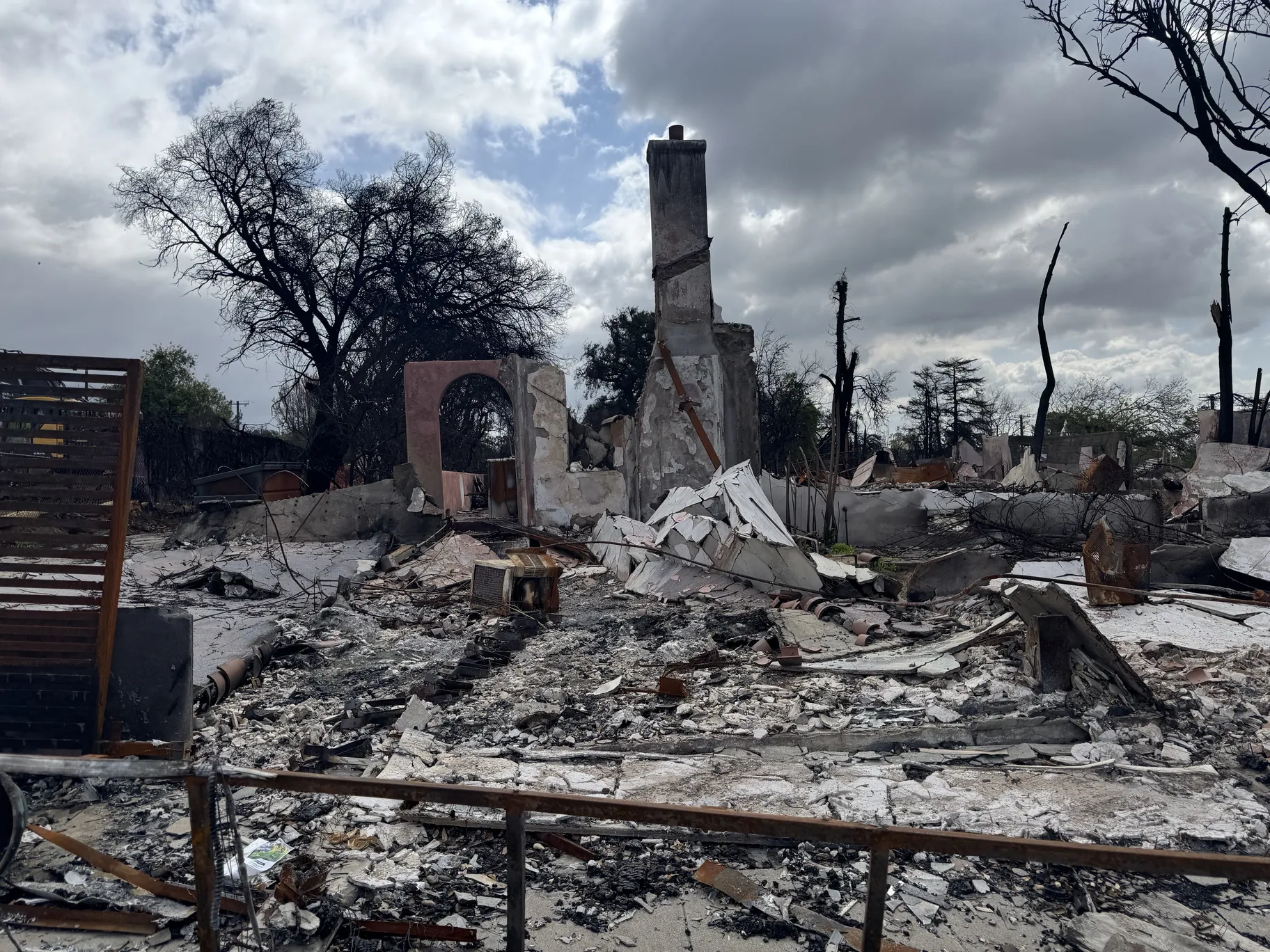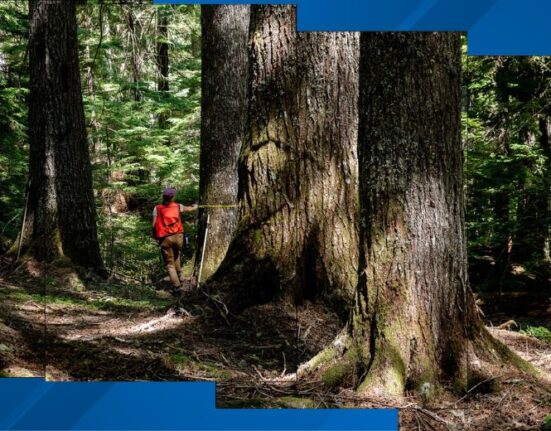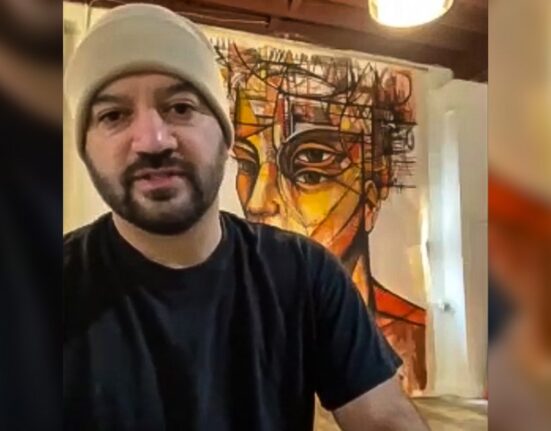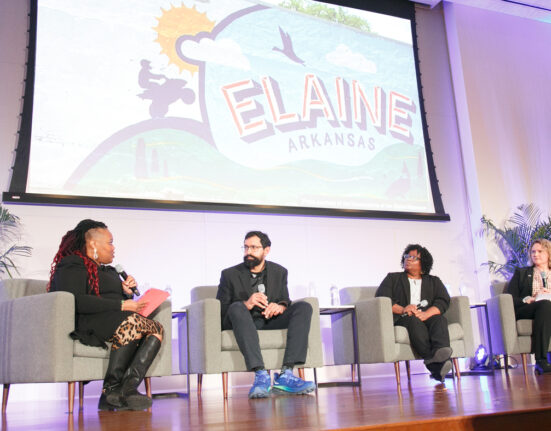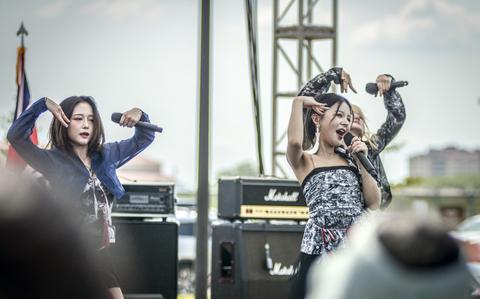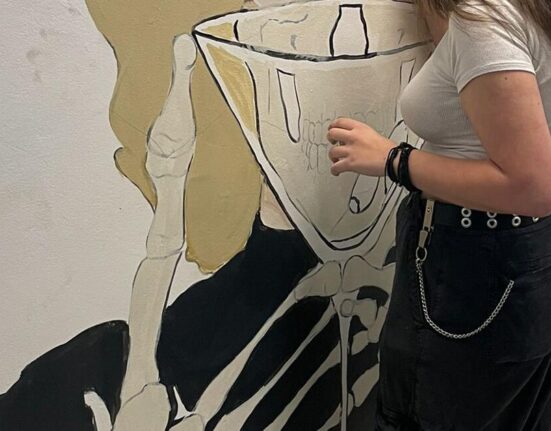The experimental art venue and community space Trade School had been open for less than four months when the Eaton Fire nearly turned it to rubble.
Among the thousands of structures destroyed by the January blaze were homes and businesses just across the street from Trade School’s storefront on Fair Oaks Avenue.
“It really did look like a bomb dropped,” says Arden Stern, who co-founded Trade School along with fellow artist Casey Anderson.
Stern, who lives in nearby Sierra Madre, recalls the moment they discovered that Trade School’s building was still standing: “I just stood in front of the building, wailing.” They credit their neighbors for helping save the property by putting out a spot fire. “ I’m one of the lucky ones, and I have a lot of guilt about that.”
In the aftermath of the fire, Stern and Anderson say they have a big responsibility. They’re determined to stay in Altadena, keep their lights and sound system on, and continue to stage art and music shows that bring people together — and just as importantly, bring people to the area.
It’s a radical stance in a neighborhood where many residents and businesses have been displaced or fled. As a result, it can sometimes feel more like a construction zone during the day and a ghost town at night — one that investors see as ripe for redevelopment.
“ Anytime historically we have seen ‘empty space’ in a U.S. landscape, it’s an erasure, right?” says Stern, citing Detroit after the collapse of the auto industry. “People who are struggling get erased from the space and it’s viewed as open, manifest-destiny stuff.” For that reason, Stern says, “We need people here now. We need to make sure that they’re highly visible. Fair Oaks Burger is doing an amazing job with that. There are all kinds of businesses around here doing amazing work with just getting people visible in Altadena so that it doesn’t look like space to be built upon.”

The Eaton Fire demolished structures just across the street from Trade School on Fair Oaks Avenue. Photo credit: Jennifer Swann.
In mid-April, following months of discussions and a professional deep cleaning, Trade School reopened its doors and held its first event since the Eaton Fire. The hip-hop show, featuring New Jersey rapper Fatboi Sharif and producer Icky Reels, LA artist Rhys Langston, and composer Topu Lyo, brought a few dozen people to the intimate storefront.
The evening was loud, joyous, and marked a triumphant return of sorts. It was Trade School’s way of saying: We’re still here.
“Shouts out to Altadena. Altadena strong, for real,” Langston riffed at one point, in between songs. “It’s crazy driving the boulevard to see how it’s changed, but you know, hopefully events like this are about cherishing the spirit of the place.”

Musician and composer Topu Lyo performs at Trade School on April 17. Photo by Jennifer Swann.
Prior to the April 17 re-opening show, Anderson and Stern — both teachers and union organizers at the ArtCenter College of Design in Pasadena — had spent months moving Trade School’s scheduled events to other venues and enlisting volunteers to help with mutual aid efforts. In early January, they joined forces with a local nonprofit called Community Solidarity Projects, which had already begun collecting donations at the Mid-City organizing space Bernie’s Coffee Shop.
“The day that the fires broke out, we just showed up at the coffee shop and said, ‘Now we’re a donation center,’” says Community Solidarity Projects volunteer Roz Jones. “We built a system for us to directly link up with families that had lost their home and had been displaced, so that they could request different supplies from us and we would bring them out to them.”
Anderson remembers driving out to the West San Fernando Valley – “I don’t even know where Winnetka is, I’d never been there” – to drop off toiletries, canned goods, and clothing to people who had been displaced by the Eaton Fire. “You’d bring these relief items to people and it’s just a car full of simple stuff, and you could see the stress that they were carrying on their shoulders, it was lifted off of them,” they say. “It was incredible. People would start to cry ‘cause they’re just so stressed out. ‘I lost my house, my kids’ school burned down.’”
These intimate, emotional conversations turned out to be mutually beneficial. “It was helpful for me too to be able to talk to people and listen to them talk about what they were dealing with, and then share what I was dealing with,” Anderson says. “It just helped me get through that experience.”
It also helped remind Anderson and Stern of one of their priorities for Trade School: To make it a place where live music and arts programming could exist side-by-side with mutual aid and community organizing.
“When we would have events at Trade School before the fires, you’d come for the performance and then you’d hang out afterwards,” says Stern, who adds that these “deep hangs” often led to fruitful conversations about labor among artists. “I thought, what if our space was about that? What if we had ways of building solidarity among artists?”

Trade School’s founders cleaned and rearranged the space in the weeks leading up to its reopening. “It’s a true D.I.Y. space,” says Arden Stern, pointing to the chairs and lighting fixtures from Facebook Marketplace and the handmade sound-absorbing panels on the ceiling. Photo credit: Jennifer Swann.
Trade School’s approach to infusing politics with cultural programming was inspired in part by Kaos Network, the storied Leimert Park art center where Anderson has volunteered for years, teaching robotics classes to kids in the neighborhood. It was founded by artist and filmmaker Ben Caldwell, who envisioned it as a youth and community center that directly serves its surrounding neighborhood.
“He saw the future in the youth at the time, in the mid-1980s, and that was through the new phenomenon of hip-hop and the new continuance of art,” says Caldwell’s son-in-law, Ed Ross III, better known by his artist names, E+RO=3, or EroZilla. “He saw all of the different technologies and stuff that’s happening and flourishing now. I think he had a vision of that back then.”
Ross, who lives in Pasadena, plans to teach digital music production classes at Trade School this summer. He also runs a monthly beats workshop and music showcase, dubbed Lofi_dena, at the venue. Ross hopes that the small, community-driven events will help bring artists and music fans back to an area that’s been dark and quiet for months.
“For people who are driving by, just to see people hanging outside, they’ll be like, ‘Oh shit, something’s going on! Nice!’” says Ross. “I don’t care what it is, it’s something nice.”

